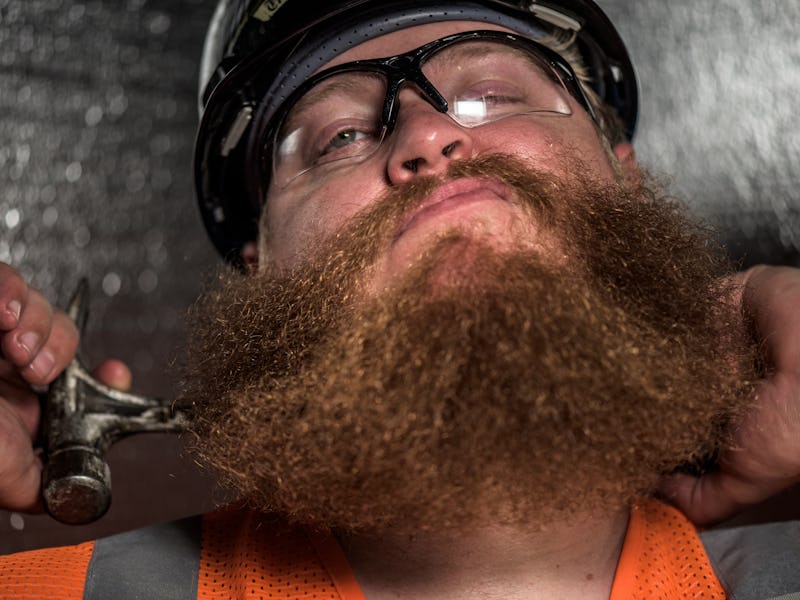Science Proving Hairiness Is Next to Cleanliness Can Prolong the Beard Boom
Just because you "look homeless" doesn't mean you're dirty. Also, don't say, "look homeless." Also, this principle applies to solar panels.

We humans have struggled to groom our body hair for millennia, alternately embracing it, forsaking it, and cutting it into weird patterns. Still, there has always been depilation and the urge to pluck, cut, or save. We want to look “clean cut.” We want to be clean.
We shouldn’t bother.
According to physical intelligence scientist Guillermo Amador, Ph.D., our assumptions couldn’t be more wrong. Sure, he says, hair catches crumbs and dust that might emit some weird smells, but in doing so it keeps potentially infectious particles off the skin itself, where their offenses wouldn’t merely be olfactory. Hair is the lesser of necessary evils.
Armed with a healthy appreciation for hair and its sanitizing capabilities, Amador is on a mission to convince scientists and engineers of two things:
- Hair is great at keeping things clean. 2. Those things don’t have to be biological.
Hairs on a honeybee's eye prevent obstructive dust particles from landing on its surface.
In one of his first hair-focused studies, Amador and his team took over the Museum of Natural History in New York and painstakingly measured the eyelashes of over 20 different mammals, discovering an unexpected correlation between eyelash length and eye width. He found, by applying principles of fluid dynamics, that eyelashes reduced the amount of air and dust that got into the eye itself, preventing it from drying out and keeping small particles off its wet surface. Realizing that the eyes of insects like fruit flies and honey bees were also completely covered in air-diverting strands led him to hypothesize that body hair might have a role in keeping organisms clean in general.
He was right.
“Particles that would land directly on the surface of the skin stick on the hair instead,” he told Inverse. “It’s a lot easier to remove particles on hair arrays than skin.”
In bees, furry arms are built-in "hairbrushes" used to sweep pollen from the body to the hind legs.
Like a shag carpet, hair collects everything that flies by, but it keeps the surface below it clean — and can easily be shaken out. And animals have evolved ingenious techniques for getting rid of errant trash in their fur, which Amador thinks could and should inspire a new generation of self-cleaning tech, as he described in a recent paper in the Journal of Experimental Biology. Insects, for example, use their fur-covered arms as brushes to sweep particles away from other hairy body parts. Couldn’t solar panels, which lose up to 7 percent of their power each year to dust accumulation, be equipped with filaments to act as particle-catching hairs, which could easily be swept up by human-made brushes? Couldn’t we cover dust-sensitive biosensors with microscopic hairs, which could flick off particles the way a dog shakes off water? He’s made a compelling enough case that the National Science Foundation is funding his team’s research into building insect-inspired self-cleaning surfaces.
Of course, applying nature’s self-cleaning paradigm to man-made devices will require human ingenuity. “It’ll be on a device by device basis,” Amador says. “For solar panels, what kinds of particles are being accumulated that prevent them from accumulating light? We can tune these hairs or filaments to those particular particles or environmental conditions.” Microelectronics, he says, can benefit too: The tiny sensors needed to cater to the Internet of Things are extremely sensitive to dust, and hair-based self-cleaning systems could extend their lifespans immensely. Amador’s dream application is to see vanity “eyelashes” on car headlights actually being used to keep the glass clean.
When it comes to ensuring human cleanliness, however, Amador admits that things are a little more complicated than simply throwing out our razors. Besides, as far as animals go, we have less of a need for body hair than, say, a housefly because a handful of pollen particles on a bug are a lot more obstructive, weight-wise, than on a human. Still, he says, an argument could be made for beard enthusiasts being cleaner than their bare-faced brethren.